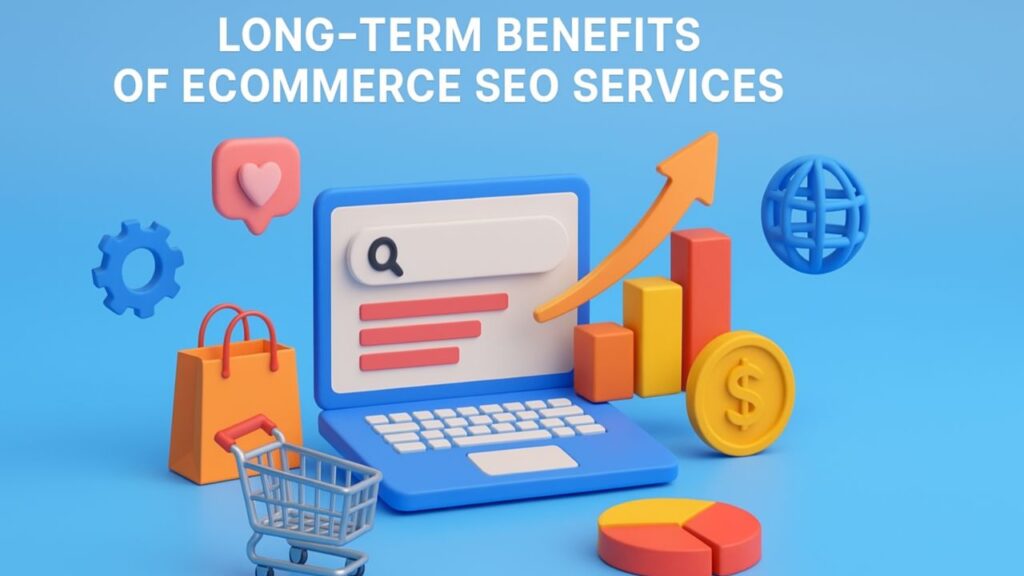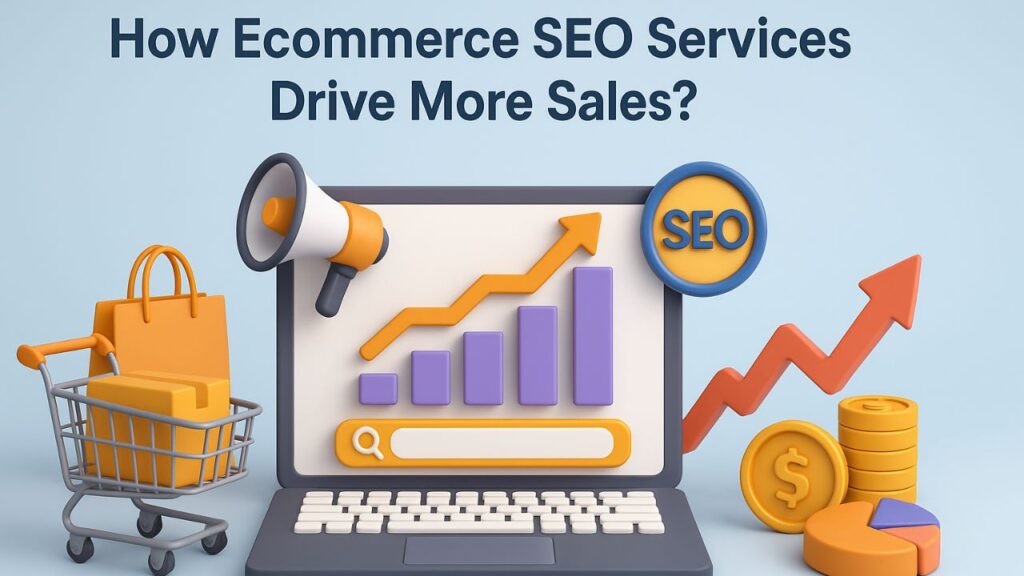In today’s digital-first retail landscape, visibility is everything. As ecommerce platforms become increasingly saturated, standing out in a sea of competitors demands more than just an attractive website or quality products. One of the most strategic tools for improving online visibility and ultimately boosting sales is ecommerce SEO services.
Search engine optimization for ecommerce is a systematic approach to making your online store more discoverable to search engines and users. It enhances user experience, improves rankings, drives targeted traffic, and encourages conversions. This article explores how ecommerce SEO services help increase sales, focusing on their mechanics, benefits, and long-term impact.
Table of Contents
Understanding Ecommerce SEO
Before diving into how SEO increases sales, it’s important to understand what ecommerce SEO involves.
Ecommerce SEO refers to the practice of optimizing an online store’s website for search engines like Google. This includes optimizing product pages, category pages, metadata, images, content, and website architecture to enhance visibility in organic search results.
Key components include:
- Keyword research and targeting
- Technical SEO
- On-page SEO
- Content optimization
- Link building
- User experience and site speed enhancements
- Mobile responsiveness
Each of these elements contributes to how a site ranks and how easily potential customers can find and interact with products.
Why SEO Matters for Ecommerce?
When users search for products online, they typically start with a search engine. Ranking high on search engine results pages (SERPs) means that your product pages are seen first, clicked on more often, and purchased more frequently.
Consider these factors:
- Most users never go beyond the first page of search results.
- Organic traffic is more sustainable and cost-effective compared to paid ads.
- SEO builds long-term visibility and brand trust.
- Optimized sites offer better user experience, reducing bounce rates and improving conversions.
Ecommerce SEO services are designed to enhance these factors in a comprehensive, sustainable way.
How Ecommerce SEO Services Drive Sales?
Let’s break down how SEO services specifically contribute to sales growth in the ecommerce space.
1. Improved Organic Visibility
The most direct way ecommerce SEO services boost sales is by increasing your site’s visibility in search results. When your product pages appear in top positions for relevant queries, they receive more clicks, which translates to more potential customers.
SEO services achieve this through:
- Targeted keyword optimization
- Structured product data
- Enhanced metadata
- Internal linking strategies
Higher rankings generate more consistent traffic from users who are already searching for products you offer.
2. Increased Targeted Traffic
All website traffic is not created equal. The focus should be on attracting users with strong purchase intent. SEO services help refine the targeting of potential customers through keyword analysis and buyer intent modeling.
Long-tail keywords and product-specific queries often bring users who are closer to the point of purchase. By optimizing for such terms, ecommerce SEO services ensure that the traffic you attract is more likely to convert into paying customers.
3. Optimized Product Pages
Product page optimization is crucial in ecommerce. These pages serve as both sales pitches and SEO content hubs. When optimized correctly, they help both search engines and users understand what’s being offered.
SEO services improve:
- Page titles and meta descriptions
- Image alt texts
- Product descriptions
- Header tags and content hierarchy
These improvements enhance usability, improve keyword relevance, and increase the likelihood of higher rankings and conversions.
4. Better User Experience
User experience (UX) and SEO go hand in hand. Search engines reward websites that offer smooth navigation, fast loading speeds, and responsive design. These same elements also create a more pleasant shopping experience, leading to higher conversion rates.
Services that focus on technical SEO optimize:
- Page load speed
- Mobile usability
- URL structure
- Site navigation
By improving how easily users can browse and purchase products, these technical enhancements indirectly but powerfully influence sales.
5. Reduced Cart Abandonment
One of the major challenges in ecommerce is cart abandonment. While many factors contribute to this, poor site performance, confusing navigation, and slow page speeds are major contributors—all of which fall under the umbrella of technical SEO.
SEO services often include auditing and fixing these issues, resulting in fewer drop-offs at the checkout stage. A streamlined experience encourages users to complete their purchases, directly impacting sales figures.
6. Authority Building Through Content
Content marketing is a core part of any ecommerce SEO strategy. By creating informative, keyword-rich content such as blog posts, how-to guides, and FAQs, your site becomes a resource—not just a storefront.
Benefits of strategic content include:
- Higher time spent on site
- Increased internal linking
- Enhanced authority in your niche
- More entry points to your site via different search queries
All of these factors contribute to improved trust, higher engagement, and ultimately more conversions. This is a significant strength of ecommerce SEO services, which focus not just on individual product pages but on the broader content ecosystem.
7. Mobile Optimization
More consumers are shopping via mobile devices than ever before. A slow or unresponsive mobile experience can cost you potential sales. SEO professionals ensure that ecommerce sites are optimized for mobile, offering smooth scrolling, fast loading, and easy navigation.
Mobile-friendly design is also a ranking factor for Google, especially with mobile-first indexing. Therefore, better mobile performance translates to improved rankings and higher mobile conversion rates.
8. Local SEO for Ecommerce
If an ecommerce store has physical outlets or operates in specific regions, local SEO becomes important. Local optimization techniques like Google Business Profile setup, local keyword targeting, and citation management help attract nearby customers.
Many ecommerce SEO services include local SEO strategies as part of a complete package. This can increase foot traffic, phone calls, and local online sales.
9. Link Building for Authority
Backlinks from credible websites act as endorsements in the eyes of search engines. Quality link building improves your site’s authority and helps it rank higher.
Ecommerce SEO services include strategic link acquisition methods like:
- Guest posting
- Resource page outreach
- Competitor backlink analysis
Improved domain authority means higher rankings, more visibility, and increased organic traffic—factors that contribute to more sales over time.
10. Continuous SEO Monitoring and Optimization
SEO is not a one-time setup. Algorithms change, competitors evolve, and search behavior shifts. Ongoing SEO monitoring ensures that your store adapts to these changes.
Professional ecommerce SEO services typically provide:
- Regular site audits
- Performance tracking
- Content updates
- Technical fixes
Consistent monitoring leads to sustained rankings and continued improvements in conversion rates, helping to maintain and grow revenue.
Long-Term Benefits of Ecommerce SEO Services

In addition to immediate gains in visibility and traffic, SEO contributes to sustainable business growth:
- Cost-efficiency: Once established, organic traffic doesn’t require ongoing ad spend.
- Brand credibility: High-ranking pages create user trust.
- Competitive advantage: SEO helps you outperform less optimized competitors.
- Data-driven improvements: Regular analysis provides insights to refine marketing strategies.
- Scalability: SEO supports growth into new markets and product categories.
These long-term outcomes demonstrate why SEO should be considered a foundational aspect of ecommerce strategy, not just a marketing add-on.
Integrating SEO with Other Marketing Channels
Ecommerce SEO doesn’t work in isolation. It complements other digital marketing strategies:
- Paid Ads: Organic traffic offsets ad costs and supports broader reach.
- Email Marketing: SEO can drive newsletter sign-ups, improving remarketing potential.
- Social Media: Content optimized for search also performs well on social platforms.
- Conversion Rate Optimization (CRO): SEO enhances UX, supporting CRO efforts.
When integrated properly, SEO amplifies the effectiveness of your entire marketing ecosystem.
Common Mistakes to Avoid in Ecommerce SEO
To gain the full benefits of SEO, it’s important to avoid certain common errors:
- Duplicate content: Especially in product descriptions.
- Ignoring mobile optimization: Leading to poor UX and lower rankings.
- Overlooking image optimization: Missing out on visual search opportunities.
- Not using structured data: Resulting in missed rich snippets.
- Focusing only on short-tail keywords: Ignoring buyer intent.
Experienced ecommerce SEO services help navigate and prevent these pitfalls through a structured and data-driven approach.
Conclusion
SEO is a fundamental driver of ecommerce success. From improving visibility and attracting qualified traffic to enhancing user experience and optimizing conversions, ecommerce SEO services play a vital role in increasing online sales. When implemented correctly, these services offer sustainable growth, measurable results, and a competitive edge.
Rather than viewing SEO as a technical necessity, it should be embraced as a strategic investment. By aligning SEO with business goals, ecommerce brands can maximize their online potential and drive consistent revenue growth.
Frequently Asked Questions (FAQ)
1. What are ecommerce SEO services?
Ecommerce SEO services are professional solutions designed to optimize online stores for search engines. They improve visibility, traffic, and conversions by enhancing various on-page and off-page elements.
2. How do ecommerce SEO services increase sales?
These services increase sales by boosting organic visibility, attracting targeted traffic, optimizing product pages, improving user experience, and reducing cart abandonment rates.
3. What are the key elements of ecommerce SEO?
Important elements include keyword research, on-page SEO, technical SEO, mobile optimization, content creation, and link building.
4. How long does it take to see results from SEO?
SEO is a long-term strategy. Results typically begin to show within 3–6 months, with more significant improvements over time.
5. Is ecommerce SEO better than paid advertising?
SEO offers sustainable, long-term traffic and credibility, while paid ads provide immediate visibility. Both work best when used together.
6. How often should SEO be updated?
SEO requires continuous monitoring and updating to adapt to algorithm changes, competitor activity, and evolving user behavior.
7. Can small ecommerce sites benefit from SEO?
Yes. Even small ecommerce sites can significantly benefit from SEO by targeting niche keywords and optimizing for user experience.
8. Do ecommerce SEO services include content writing?
Most ecommerce SEO services include content optimization and sometimes content creation to improve keyword targeting and user engagement.



